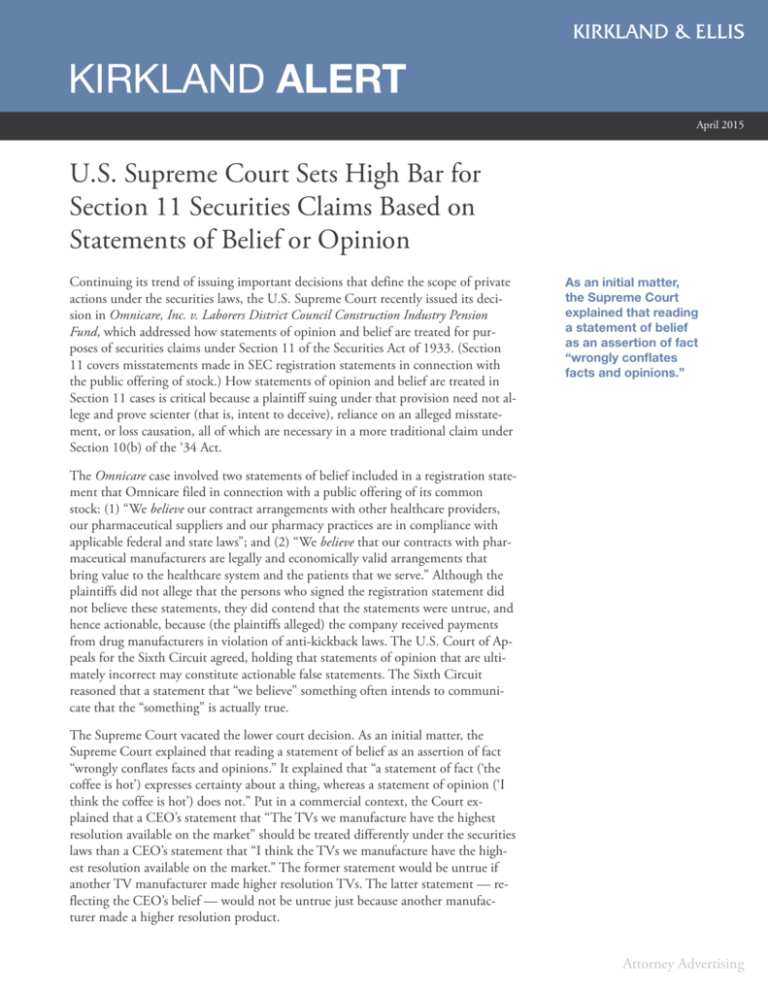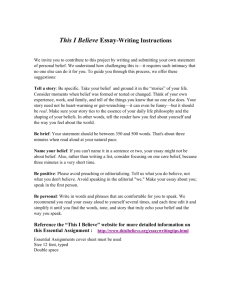
KIRKLAND ALERT
April 2015
U.S. Supreme Court Sets High Bar for
Section 11 Securities Claims Based on
Statements of Belief or Opinion
Continuing its trend of issuing important decisions that define the scope of private
actions under the securities laws, the U.S. Supreme Court recently issued its decision in Omnicare, Inc. v. Laborers District Council Construction Industry Pension
Fund, which addressed how statements of opinion and belief are treated for purposes of securities claims under Section 11 of the Securities Act of 1933. (Section
11 covers misstatements made in SEC registration statements in connection with
the public offering of stock.) How statements of opinion and belief are treated in
Section 11 cases is critical because a plaintiff suing under that provision need not allege and prove scienter (that is, intent to deceive), reliance on an alleged misstatement, or loss causation, all of which are necessary in a more traditional claim under
Section 10(b) of the ‘34 Act.
As an initial matter,
the Supreme Court
explained that reading
a statement of belief
as an assertion of fact
“wrongly conflates
facts and opinions.”
The Omnicare case involved two statements of belief included in a registration statement that Omnicare filed in connection with a public offering of its common
stock: (1) “We believe our contract arrangements with other healthcare providers,
our pharmaceutical suppliers and our pharmacy practices are in compliance with
applicable federal and state laws”; and (2) “We believe that our contracts with pharmaceutical manufacturers are legally and economically valid arrangements that
bring value to the healthcare system and the patients that we serve.” Although the
plaintiffs did not allege that the persons who signed the registration statement did
not believe these statements, they did contend that the statements were untrue, and
hence actionable, because (the plaintiffs alleged) the company received payments
from drug manufacturers in violation of anti-kickback laws. The U.S. Court of Appeals for the Sixth Circuit agreed, holding that statements of opinion that are ultimately incorrect may constitute actionable false statements. The Sixth Circuit
reasoned that a statement that “we believe” something often intends to communicate that the “something” is actually true.
The Supreme Court vacated the lower court decision. As an initial matter, the
Supreme Court explained that reading a statement of belief as an assertion of fact
“wrongly conflates facts and opinions.” It explained that “a statement of fact (‘the
coffee is hot’) expresses certainty about a thing, whereas a statement of opinion (‘I
think the coffee is hot’) does not.” Put in a commercial context, the Court explained that a CEO’s statement that “The TVs we manufacture have the highest
resolution available on the market” should be treated differently under the securities
laws than a CEO’s statement that “I think the TVs we manufacture have the highest resolution available on the market.” The former statement would be untrue if
another TV manufacturer made higher resolution TVs. The latter statement — reflecting the CEO’s belief — would not be untrue just because another manufacturer made a higher resolution product.
Attorney Advertising
KIRKLAND ALERT | 2
Omnicare addressed two ways in which courts should consider statements of belief
or opinion in a Section 11 case: whether such statements are false statements of material fact, and whether such statements omit material facts necessary to make them
not misleading.
Analyzing Whether Statements Of Belief Or Opinion Are Untrue
The Supreme Court explained that the first question is whether the statement of
belief or opinion constitutes a false statement of material fact. This analysis is necessary even for statements of belief or opinion because “every such statement explicitly affirms one fact: that the speaker actually holds the stated belief.” Thus, if a
CEO stated, “We believe the TVs we manufacture have the highest resolution available on the market,” but the CEO did not actually believe that to be true, it would
be a false statement of fact. Relatedly, some statements of belief or opinion incorporate other statements of fact. For instance, if the CEO said, “I believe our TVs have
the highest resolution available because we use a patented technology to which our
competitors do not have access,” that statement would be both a statement of the
CEO’s belief and a statement of existing fact about the patented technology used by
the company.
But as a general matter, a statement of belief or opinion is a false statement only if
the speaker did not honestly hold the belief expressed. Thus, the Supreme Court
held, a plaintiff cannot state a viable Section 11 claim at the pleading stage simply
by alleging that the statement turned out to be wrong, because the statute “does not
allow investors to second-guess inherently subjective and uncertain assessments.”
Rather, the plaintiff will have to plead with particularity facts that, if proved, would
show that the speaker did not honestly hold such a belief. That is a difficult standard for a plaintiff to meet.
Analyzing Whether Statements Of Belief Or Opinion Omitted
Material Facts Necessary To Make Them Not Misleading
The Supreme Court next explained how courts should evaluate a claim that facts
omitted from a statement of opinion or belief render the statement materially misleading. The Court explained that when a speaker makes a statement of belief or
opinion, a reasonable investor may understand that to mean the speaker has some
basis for the belief or opinion. For example, if a CEO says, “We believe our conduct
is lawful,” the Court held that an investor likely would expect “such an assertion to
rest on some meaningful legal inquiry — rather than, say, on a mere intuition, however sincere.” If the speaker had not undertaken any legal inquiry, the Court held,
that might constitute a misleading omission. Similarly, if the CEO made the same
statement, but at the time knew that the statement was contrary to the company’s
lawyers’ advice or that the federal government was taking the opposite view, that
too might constitute a misleading omission — even if that was the CEO’s honestly
held view and so the statement was true. The Supreme Court summarized this
analysis: “Thus, if a registration statement omits material facts about the issuer’s inquiry into or knowledge concerning a statement of opinion, and if those facts con-
As a general matter, a
statement of belief or
opinion is a false
statement only if the
speaker did not honestly hold the belief
expressed.
KIRKLAND ALERT | 3
flict with what a reasonable investor could take from the statement itself, then §11’s
omissions clause creates liability.”
To state a claim for an omission in the context of a statement of belief, the Court
explained, an investor cannot simply allege that an opinion was wrong. The complaint “must as well call into question the issuer’s basis for offering the opinion.”
The Court rejected the proposition that a plaintiff could state a claim merely by alleging that the speaker failed to reveal the basis for the statement of belief or opinion. Rather, the plaintiff “must identify particular (and material) facts going to the
basis for the issuer’s opinion — facts about the inquiry the issuer did or did not
conduct or the knowledge it did or did not have — whose omission makes the
opinion statement at issue misleading to a reasonable person reading the statement
fairly and in context.” That too is a difficult standard for a plaintiff to satisfy.
To state a claim for an
omission in the context
of a statement of belief,
the Court explained, an
investor cannot simply
allege that an opinion
was wrong. The complaint “must as well call
into question the issuer’s basis for offering
the opinion.”
Consequences
Omnicare sets a high bar for shareholders seeking to state a claim and prove a securities fraud case based on statements of belief or opinion, as well as similar “subjective
and uncertain” statements. Plaintiffs can no longer contend that statements of opinion or belief are actionable if they ultimately turn out to be false or incorrect.
Rather, plaintiffs have to allege and prove that the speaker did not honestly believe
the opinion expressed, or that the speaker omitted material information about the
basis for the opinion (or lack thereof ) that made it misleading. We expect that this
standard will make it difficult both to plead and to prove Section 11 claims based
on statements of belief or opinion, although we do not expect Omnicare to slow securities plaintiffs’ attempts to do so. And although Omnicare itself was a Section 11
case, the Court’s analysis may apply more broadly to securities actions regarding allegedly false statements of opinion or belief made in contexts other than registration
statements.
To maximize the protection Omnicare offers, companies will want to consider how
to clearly identify statements of opinion or belief. Companies will also want to consider how much to say about the basis for their statements of belief or opinion. For
instance, in certain situations explaining the basis for a statement of opinion or belief may help investors to understand better the certainty (or degree of uncertainty)
the issuer has about the statement. Similarly, in certain situations acknowledging
that there are dissenting views or conflicting facts also might help investors understand better the level of certainty with which the issuer is expressing its view. In
other situations, however, such additional information may be more confusing than
helpful to investors, or may simply be immaterial. Such considerations must be addressed on an issue-by-issue basis as they arise.
To maximize the protection Omnicare offers,
companies will want to
consider how to clearly
identify statements of
opinion or belief.
KIRKLAND ALERT | 4
If you have any questions about the matters addressed in this Kirkland Alert, please contact the following Kirkland authors or your regular
Kirkland contact.
Mark Filip, P.C.
Kirkland & Ellis LLP
300 North LaSalle
Chicago, IL 60654
www.kirkland.com/mfilip
+1 (312) 862-2192
Robert Khuzami
Kirkland & Ellis LLP
655 Fifteenth Street, N.W.
Washington, D.C. 20005
www.kirkland.com/rkhuzami
+1 (202) 879-5055
Yosef J. Riemer, P.C.
Kirkland & Ellis LLP
601 Lexington Avenue
New York, NY 10022
www.kirkland.com/yriemer
+1 (212) 446-4802
Matthew Solum
Kirkland & Ellis LLP
601 Lexington Avenue
New York, NY 10022
www.kirkland.com/msolum
+1 (212) 446-4688
Joshua Z. Rabinovitz
Kirkland & Ellis LLP
300 North LaSalle
Chicago, IL 60654
www.kirkland.com/jrabinovitz
+1 (312) 862-2284
This communication is distributed with the understanding that the author, publisher and distributor of this communication are not rendering legal,
accounting, or other professional advice or opinions on specific facts or matters and, accordingly, assume no liability whatsoever in connection with its
use. Pursuant to applicable rules of professional conduct, this communication may constitute Attorney Advertising.
© 2015 Kirkland & Ellis LLP. All rights reserved.
www.kirkland.com






